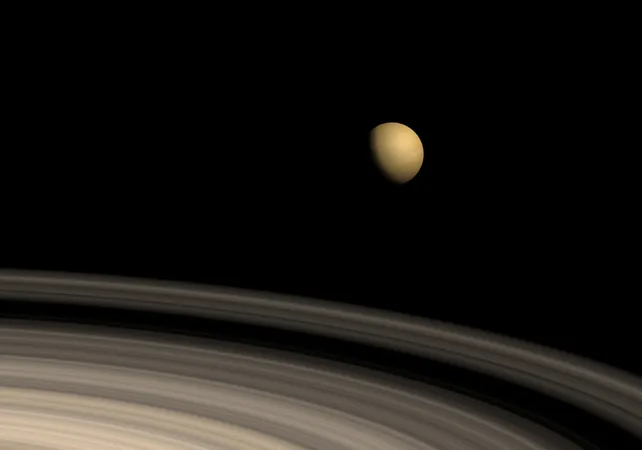
Shocking Discovery: Life on Saturn's Moon Titan?
2025-04-09
Author: Siti
Could Titan Harbor Secret Life Forms?
Saturn's enigmatic moon Titan, shrouded in a thick haze and covered in rivers of liquid methane, has long captivated scientists. Now, fresh research hints that this icy world might harbor tiny amounts of life beneath its mysterious atmosphere!
A Revolutionary Study Unveils Titan's Potential for Life
An international research team, led by Antonin Affholder from the University of Arizona, has taken a closer look at what life on Titan might actually entail. Their groundbreaking study focuses on Titan's unique wealth of organic materials, suggesting that conditions could be ripe for microscopic organisms.
Titan's Subsurface Ocean: A Hidden Habitat?
By utilizing advanced bioenergetic modeling, the researchers proposed that Titan's subsurface ocean—potentially 300 miles deep—could support life forms that feed on organic compounds. Surprisingly, they found that while Titan might host simple microscopic life, it's likely just a fleeting handful of biomass.
Earthlike Yet Alien: Titan’s Unique Environment
Described as 'Earthlike on the surface and oceanic within,' Titan is a prime target for NASA's upcoming Dragonfly mission. However, researchers caution that the previous overly optimistic estimates regarding life on Titan may be misguided. Affholder stresses that just because Titan is rich in organic matter doesn't mean it's automatically a buffet for life.
Fermentation: The Key to Understanding Life?
Central to their investigation is the age-old process of fermentation—a metabolic process found in sourdough bread and beer that thrives without oxygen. This back-to-basics approach might reveal how life could exist on Titan without the need for speculative biological mechanisms.
Glycine: The Building Block of Life?
Focusing on glycine, the simplest amino acid, the team recognized that while glycine is prevalent across the Solar System, only a tiny fraction of it on Titan could be consumed by potential microbes in the moon's ocean. Their simulations indicate that these microbes would need a constant supply of glycine from the surface, adding another layer of complexity to the hunt for life.
A Tiny Biosphere?
The researchers concluded that the expected microbial population would be minuscule, equivalent to the weight of a small dog—approximately just a few kilograms. This means less than one cell per liter of the vast ocean, making the prospect of discovering life a daunting challenge.
Future Missions: A Needle in a Haystack?
With hopes for future missions to Titan, the odds of uncovering any signs of life appear slim. Affholder suggests that Titan's abundant organic material may not be as accessible or useful for life as initially believed. Are we searching in the wrong places?
As scientists prepare for the next steps in exploring this intriguing moon, Titan continues to spark our curiosity about the possibilities of life beyond Earth.


 Brasil (PT)
Brasil (PT)
 Canada (EN)
Canada (EN)
 Chile (ES)
Chile (ES)
 Česko (CS)
Česko (CS)
 대한민국 (KO)
대한민국 (KO)
 España (ES)
España (ES)
 France (FR)
France (FR)
 Hong Kong (EN)
Hong Kong (EN)
 Italia (IT)
Italia (IT)
 日本 (JA)
日本 (JA)
 Magyarország (HU)
Magyarország (HU)
 Norge (NO)
Norge (NO)
 Polska (PL)
Polska (PL)
 Schweiz (DE)
Schweiz (DE)
 Singapore (EN)
Singapore (EN)
 Sverige (SV)
Sverige (SV)
 Suomi (FI)
Suomi (FI)
 Türkiye (TR)
Türkiye (TR)
 الإمارات العربية المتحدة (AR)
الإمارات العربية المتحدة (AR)